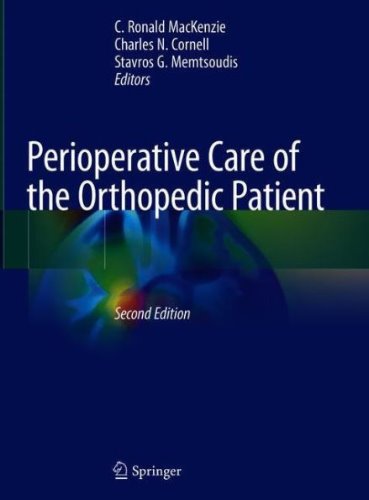
Part I. Preoperative Considerations
1. General Principles and Practices of Perioperative Medicine
2. Perioperative Risk Models
3. The Prevalence of Disabling Musculoskeletal Conditions and the Demand for Orthopedic Surgery in the Twenty-First
Century
4. The Rheumatic Diseases: A Primer
5. The Pathophysiologic Events of Total Joint Replacement Surgery
Part II. Anesthesiologic Management
6. Anesthesia in the Orthopedic Patient
7. Pediatric Anesthesia for Orthopedic Surgery
8. Anesthetic Techniques and Their Clinical Application for Specific Orthopedic Procedures
9. The Role of the Postanesthesia Care Unit in the Perioperative Care of the Orthopedic Patient
10. Postoperative Pain Management in the Orthopedic Setting
11. Enhanced Recovery After Surgery (ERAS) Protocols in Orthopedic Patients
Part III. Medical Management in Specific Clinical Settings
12. Perioperative Care of the Orthopedic Patient with Connective Tissue Disease
13. Perioperative Care of the Orthopedic Patient with Cardiac Disease
14. Perioperative Care of the Orthopedic Patient with Chronic Pulmonary Disease
15. Perioperative Care of the Orthopedic Patient with Renal Disease
16. Perioperative Care of the Orthopedic Patient with Diabetes Mellitus
17. Perioperative Care of the Orthopedic Patient with Gastrointestinal and Liver Issues
18. Perioperative Care of the Orthopedic Patient with Neurological Disease
19. Perioperative Care of the Orthopedic Patient with Sleep-Disordered Breathing: Obstructive Sleep Apnea
20. Perioperative Care of the Patient with Psychiatric Disease
21. Perioperative Care of the Orthopedic Patient with Chronic Pain
22. Perioperative Care of the Orthopedic Patient with Gout
Part IV. Specific Perioperative Problems in Orthopedic Surgery
23. Perioperative Care of the Elderly Orthopedic Patient
24. Venous Thromboembolism and Orthopedic Surgery
25. Coagulation Disorders and Orthopedic Surgery
26. Perioperative Nutrition in the Orthopedic Surgical Patient
27. Infection and Perioperative Orthopedic Care
28. Risks and Benefits of Bilateral Total Knee Replacement Surgery
29. Compartment Syndrome and Orthopedic Surgery: Diagnosis and Management
30. Bone Health and Orthopedic Surgery
31. Perioperative Care of the Complex Spine and Scoliosis Surgery Patient
32. Management of Blood Products in Orthopedic Surgery
Part V. Role of Allied Services
33. Professional Nursing Practice in the Orthopedic Care Setting
34. The Approach to Physical Therapy Following Orthopedic Reconstructive Surgery
35. Introduction of Clinical Pathways in Orthopedic Surgical Care: The Experience of the Hospital for Special Surgery
36. Achieving Value in Orthopedic Surgery: Clinical Pathways, Bundled Payment Programs, and Proactive Risk Assessment
for Elective Orthopedic Procedures
37. Bioethical Considerations in Perioperative Orthopedic Medicine


